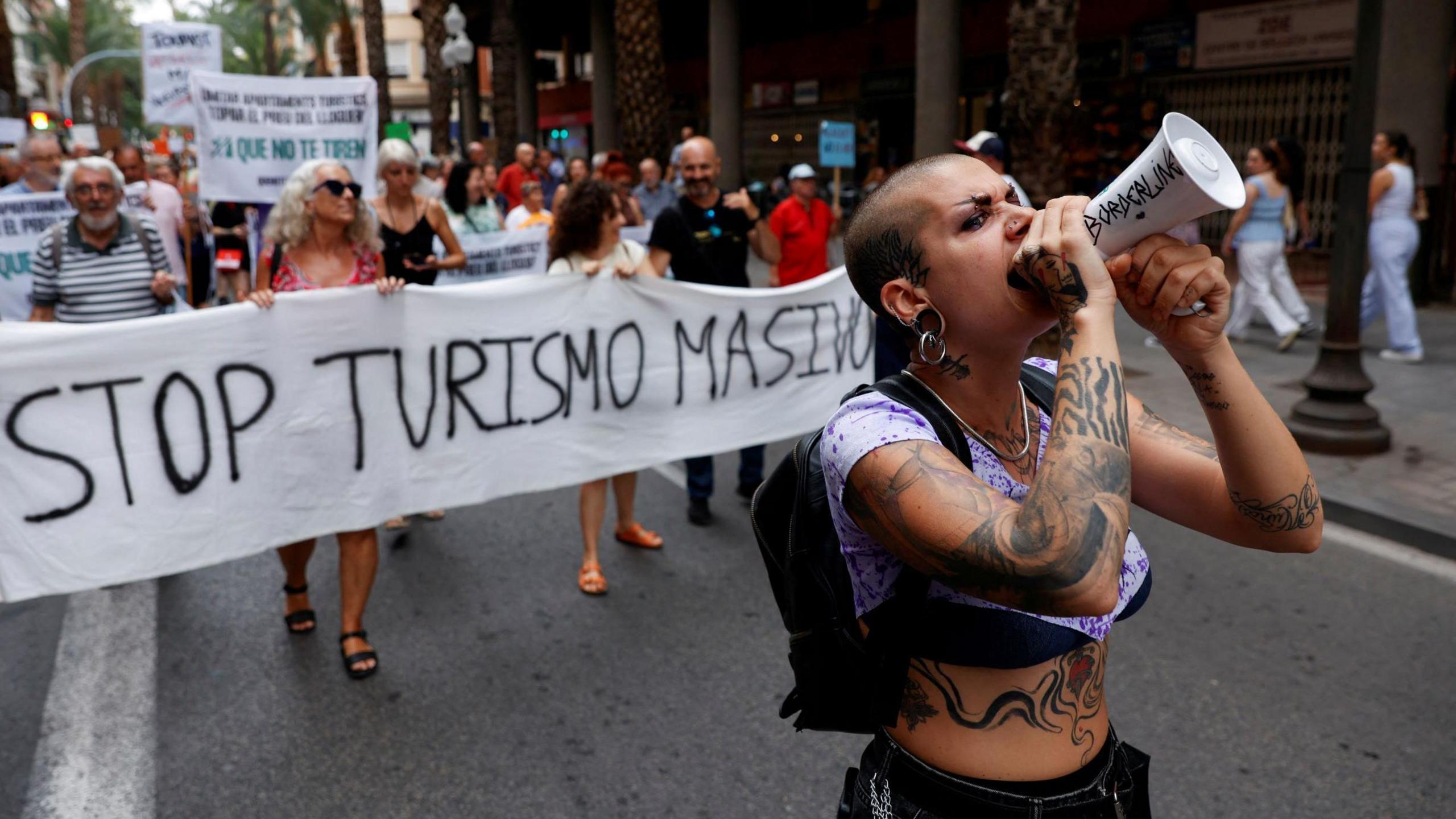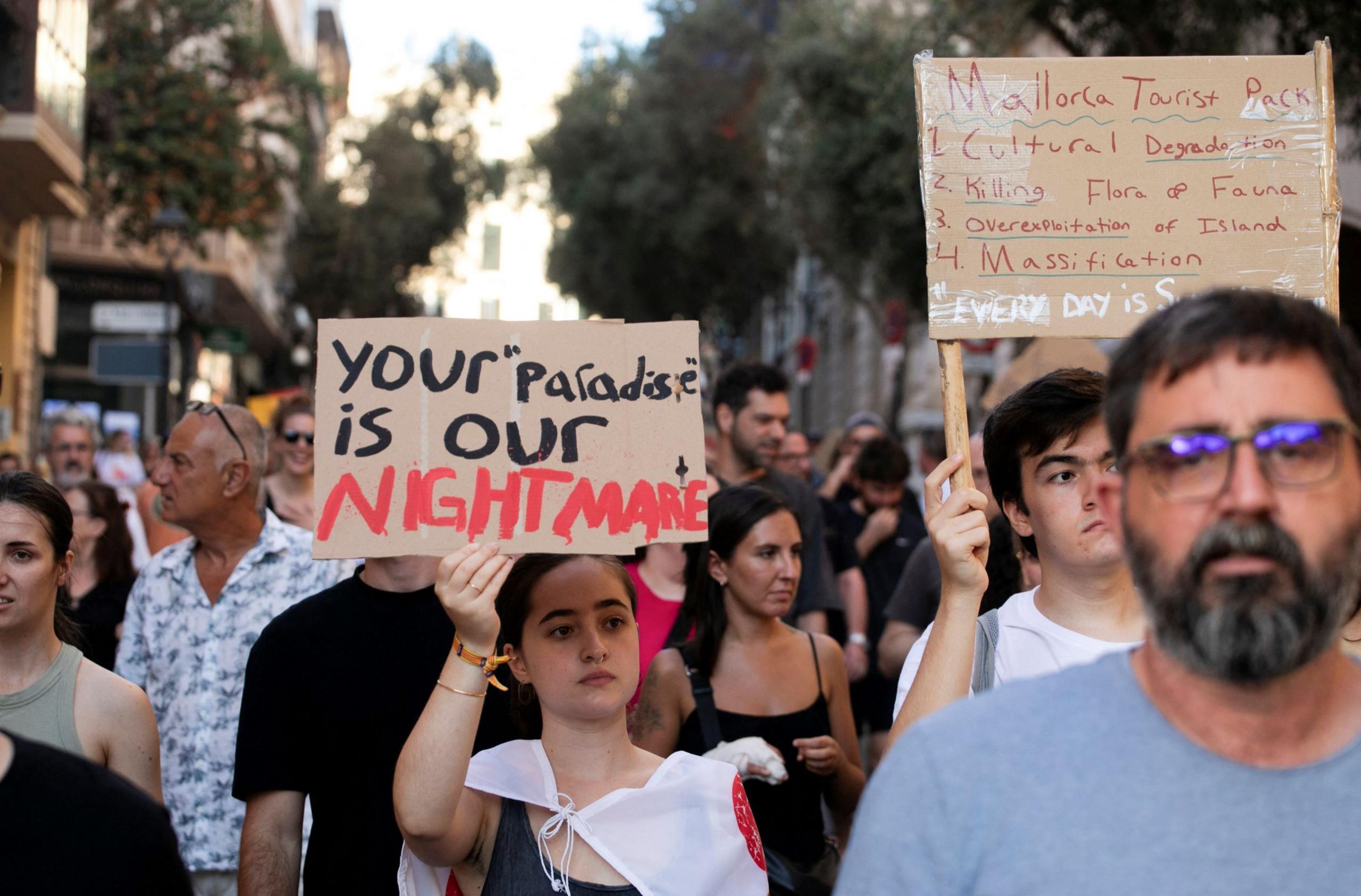'We are in danger' - Spanish anti-tourism spills into winter season

- Published
It’s well past the August holiday peak, but anger against over-tourism in Spain is spilling into the off-season, as holiday-makers continue to seek winter sun.
On Sunday locals in the Basque city of San Sebastian plan to take to the streets under the banner: “We are in danger; degrow tourism!”
And in November anti-tourism protesters will gather in Seville.
Thousands turned out last Sunday in the Canary Islands, so the problem is clearly not going away.
This year appears to have marked a watershed for attitudes to tourism in Spain and many other parts of Europe, as the post-Covid travel boom has seen the industry equal and often surpass records set before the pandemic.
Spain is expected to receive more than 90 million foreign visitors by the end of the year. The consultancy firm Braintrust estimates that the number of arrivals will rise to 115 million by 2040, well ahead of the current world leader, France.
'Tourists go home'
This year’s protests began in April, in the Canary Islands, and included a hunger strike by six protesters in Tenerife in an attempt to halt two major tourism projects on the island.
They continued in many of the country’s most popular tourist destinations, such as the Balearic Islands, the Mediterranean city of Alicante, cities on the southern coast and Barcelona, where some protesters squirted foreign visitors with water pistols and shouted: “Tourists go home!”.
The grievances driving the upcoming protests are similar to those in the summer.
“Tourism, which for a few is the golden goose, is an economic model which is choking the rest of us,” said Bizilagunekin (or “with the neighbours”, in the Basque language), the civic association which is organising Sunday’s demonstration in San Sebastian.
The protest is the culmination of a series of debates, talks and other events in the city called “October against touristification”.
“What we’ve been seeing over the last eight or 10 years has been a huge acceleration of the process of ‘touristification’,” said Asier Basurto, a member of the platform. “All our city’s services have been put at the orders of the tourism industry.”

He insists the numbers of arrivals themselves are not the problem, it is the way the city caters to visitors rather than residents.
Public spaces are adapted for short-term visits and the tourism industry creates precarious jobs, he says.
Mr Basurto believes tourists are pushing up rentals, largely because of short-stay accommodation, sending local residents further and further away from San Sebastian’s historic centre.
“We’ve had a way of living for generations and generations – in which people are connected to each other and those who arrive are integrated,” he added.
“If we have a model whereby people just visit for five days and then leave then it becomes a soulless theme park, without culture, without a community.”
The complaint about tourism’s impact on rental rates is a common theme and feeds into a broader housing crisis across Spain. The country’s central bank has reported that nearly half of families who rent at market prices are at risk of poverty or social exclusion.
However, with tourism representing 13% of Spain’s GDP and directly providing around three million jobs, its supporters insist that the industry is essential to the economy and that it drove the country’s recovery in the wake of the pandemic.
They are particularly concerned by scenes such as that on Playa de las Américas in Tenerife on October 20, where one video showed two tourists sunbathing on the beach while protesters chanted just metres away from them.
There have also been reports in the Spanish media of more hostile behaviour, such as the locks of tourist apartments in Seville being covered in faeces.
Such incidents prompted David Morales, head of tourism for the conservative People’s Party (PP) in the Canary Islands, to insist on “the right of tourists to enjoy their holidays without being the target of interruptions or gestural or verbal attacks, and certainly not physical attacks".
'Tourism-phobia'
As the protests continue beyond the summer, there are particular concerns in destinations like the Canary Islands, where the climate means they receive large numbers of visitors during the winter months.
The president of the Circle of Impresarios and Professionals in Southern Tenerife (CEST), Javier Cabrera, warned that “under an umbrella of legitimate grievances, tourism-phobia is being cultivated”.
There has been an attempt to defuse the backlash, with a range of measures being implemented.
Barcelona city hall has announced that short-term tourist apartments will be banned from 2028.
Local authorities in Palma de Mallorca have put a cap on the number of cruise liners which can dock in its port.
In Tenerife, a new limit has been introduced on the number of visitors to some natural parks.
And in Seville, a new charge is planned for those entering the city’s popular Plaza de España square.
Yet Asier Basurto is not convinced and says the protests must continue.
“Those who advocate tourism can no longer say that everything is rosy,” he said.
"Either we change this now or it’s going to be too late.”
Málaga tourism: 'People feel the city is collapsing'
- Published2 September 2024
Can Wales avoid Europe's mass tourism tensions?
- Published14 August 2024
Venice to double number of days tourists must pay entry fee
- Published24 October 2024
Global tourism is booming. These people would rather it wasn’t
- Published31 May 2024
Get in touch
Have you been affected by the protests or are you reconsidering your holiday plans?